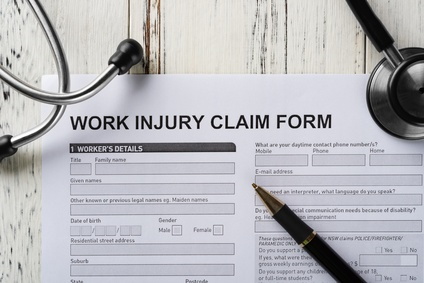When we talk about personal injury claims in the world of business the focus tends to be on the incident and the level of compensation. This is perfectly understandable in the event of a court case and ruling in favour of the claimant. However, if we dig a little deeper the real value of personal injury claims is the ability of businesses to learn from past indiscretions and mistakes.
 We have seen many situations where businesses have acted according to the law but a lack of records and differing recollections can often lead to expensive court cases. So, let us flip the traditional personal injury claims coin and look at employers. How can employers learn from past mistakes, avoid repeat events and above all ensure the safety and well-being of their workforce?
We have seen many situations where businesses have acted according to the law but a lack of records and differing recollections can often lead to expensive court cases. So, let us flip the traditional personal injury claims coin and look at employers. How can employers learn from past mistakes, avoid repeat events and above all ensure the safety and well-being of their workforce?
Report all accidents at work
It is imperative both from a business and a legal point of view that all accidents at work involving employees, whether on work premises are not, are recorded. The reason is simple, looking back over accident reports can give an idea where safety could be tightened, procedures could be changed or there may be a need to move personnel. While the vast majority of work-related accidents occur on work premises this is not always the case. It is also essential to make employees aware of the need to report all accidents, mind or major, and the long-term benefits to the workplace.
Keep your accident book to hand
In the hustle and bustle of everyday life, we are often tempted to put off until tomorrow something we could do today. This is basic human nature. However, when it comes to the workplace accident book this needs to be visible and available at all times. Even a relatively small delay of 24 hours in adding an incident to the accident book can lead to details becoming a little vague and inaccuracies. While not all incidents noted in the accident book will result in personal injury claims, all information should be added as soon as possible, in as much detail as you can.
Signed documents
While many businesses still operate on a handshake, the legal profession requires signed documentation from witnesses. Over the years we have seen many occasions where there have been relatively minor incidents in the workplace which have been noted in the accident book. Further down the line, an employee may decide to take action and challenge the details and severity recorded by their employer as they seek compensation. Unless an employer has a statement signed by the claimant confirming the details of the incident, often relatively minor, they may leave themselves open to legal action.
Insurance cover
There is a general misconception that the vast majority of personal injury claims are paid out of business funds when in reality it tends to be covered by insurance. As with any type of insurance cover it is essential that the insurance provider is kept abreast of any incidents of note. Yes, this may impact premiums in the short term but some accidents might have no impact on your cover whatsoever. However, failure to report incidents could lead to problems, especially matters detailed in the Health and Safety Executive’s RIDDOR list – incidents which need to be reported to insurance companies. If you fail to abide by insurance company rules then your cover may be withdrawn potentially leaving you open to large expenses which could threaten the future of your business.
Report facts not opinions
In the aftermath of a minor or major injury many people will be quick to assign blame to one or more parties. While admittance of guilt at this particular juncture could potentially be overturned in the future, it can also weaken the employer’s legal position somewhat. Therefore, when reporting details of an accident in the workplace, report facts not opinions and presumptions. In the event of legal action further down the line it would be the role of the courts to disseminate details of the accident and apportion the relevant level of blame.
You can never have too much detail!
Photographs, witness statements, CCTV coverage and even instruction guides (where machinery is involved) should be gathered in the event of an accident in the workplace. As long as the detail recorded is factual, and not opinion, you can’t have enough. All witness statements should be signed and dated, details added to photographs and copies of CCTV coverage stored securely. While traditionally there is a three-year window in which to pursue a claim, as a consequence of negligence, this could be extended where the injuries are diagnosed further down the line.
If someone makes a claim against you and you have no evidence to defend yourself this will not help your case.
Working with employees
There should never be a toxic environment where employers are working against employees to undermine a personal injury claim. The details of any claim should be factual with the claim handled on an arm’s-length basis and not allowed to undermine the employer/employee relationship. In theory this is “just business” but in reality human nature can see some people holding a grudge. In this instance it might be sensible to place an unconnected party in charge of overseeing the claim. This also relates to incidents of whistleblowing and the array of legal protections offered to whistleblowers.
Remember, in the event that an employee considers a claim for compensation further down the line it will look better if their employer has communicated in an orderly fashion. Opinions can be aired but there must be no pressure on the alleged victim and no attempt to undermine the laws covering accidents in the workplace.
Take legal advice when necessary
Even though much of the focus tends to be on employees claiming against employers for alleged negligence, there will be cases where employers need to take disciplinary action against employees. However, before taking such action the employer must ensure their paperwork is in place, procedures clear and helpful and all employees have undertaken regular training with updates. Many people fail to realise that this is a legal obligation of employers, regular training and updates, and can often help to mitigate (or eliminate) the level of compensation in a personal injury claim.
All legal advice at the time should be recorded and stored as you just never know when this might be needed.
Changing procedures
As we touched on in the initial paragraph, the real long-term value of personal injury claims is changing procedures and improving training. It may be that machinery needs serviced more often, perhaps some machinery needs replaced or training manuals updated. We have also seen occasions where employers have increased the level of experience/skill required for certain roles to protect themselves (and employees) going forward. Warning signage is a simple but very effective means of reminding employees of the dangers and also their responsibilities.
In simple terms, if an employer fails to learn in the aftermath of accidents in the workplace then these accidents could keep on happening time and time again. Spending extra money today could save a lot more money tomorrow – and potentially lives!
Keeping records secure
There are various legal obligations when it comes to record-keeping but the absolute minimum when it comes to accident reports is three years. Traditionally, there is a three-year window of in which a claimant can pursue compensation from their employer. In some circumstances this can be extended and therefore longer retention of records could help to fight any claim. Substandard record-keeping can also have an impact with an employer’s relationship with their insurance company. We live in an age of electronic storage which is extremely cheap so there are no real excuses.
Employees have an obligation to report accidents
If we flip the personal injury claim coin again, let us look at the long-term role of employees when it comes to safety in the workplace. There have been many occasions in the past when employees have been injured at work, maybe through employer negligence, but have been too worried about their job to report the incident. Living expenses continue to rise and employment positions can be difficult to find in your preferred trade. Therefore, many employees will choose not to report an array of different accidents in order to maintain an amicable relationship with their employer. This is wrong.
It is only by employees reporting accidents that improvements, across industries and not only individual businesses, can be made for the benefit of all employees. There may be some accidents which do not result in personal injury claims but might still lead to employers reviewing their procedures and making changes. If we take a step back and look at the bottom line, if an employer is not made aware of injuries received as a consequence of accidents in the workplace then how can they improve safety for everybody?
Conclusion
Unfortunately, once a personal injury claim has been lodged this can tend to sour the relationship between employees and employers although this should not really be the case. As a consequence, it is vital that employers ensure their records are up-to-date, all accidents are reported and the relevant parties are made aware of emerging accident trends. If personal injury claimants of the past had not pursued their compensation then we would have seen limited improvements in overall workplace safety.
In a perfect world employers and employees would work together to jointly improve safety in the workplace. In reality, we live in a world where these two parties are often pitted against each other which is often detrimental to the long-term profitability and performance of businesses.



